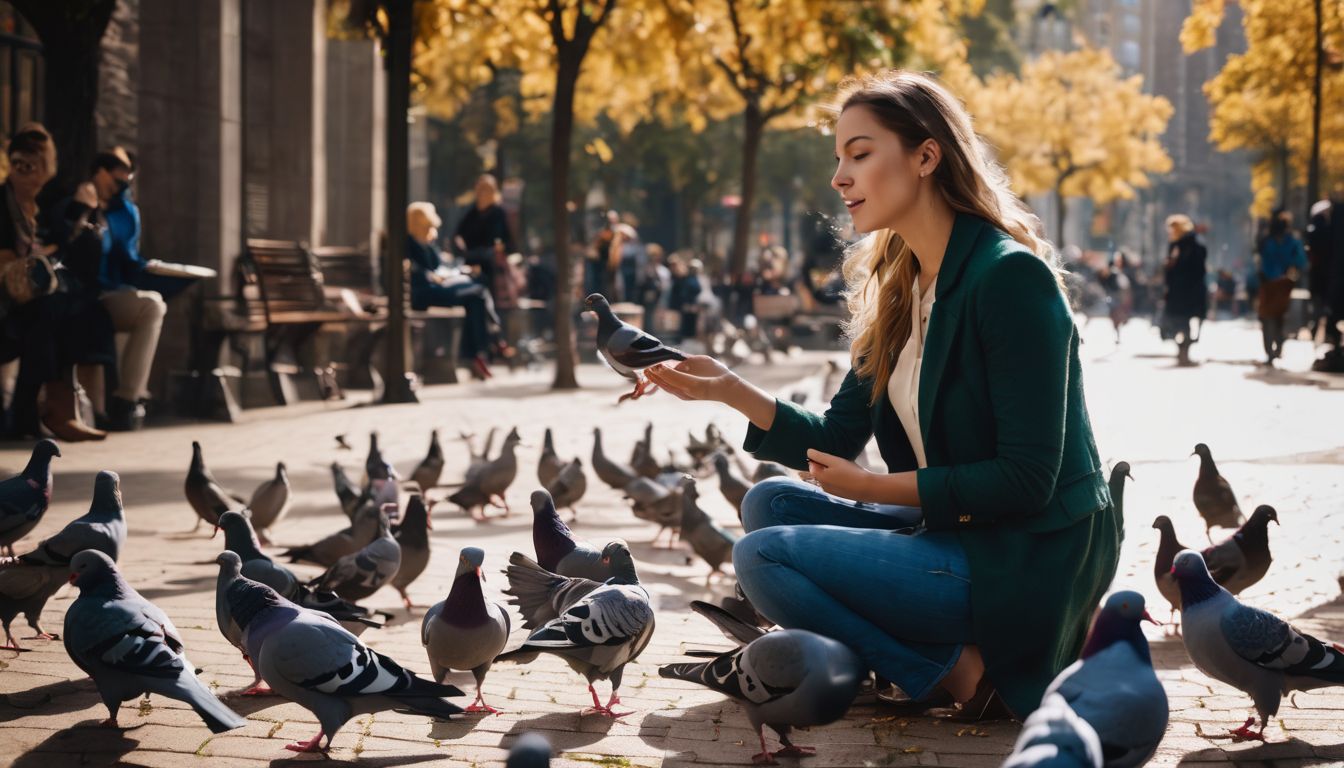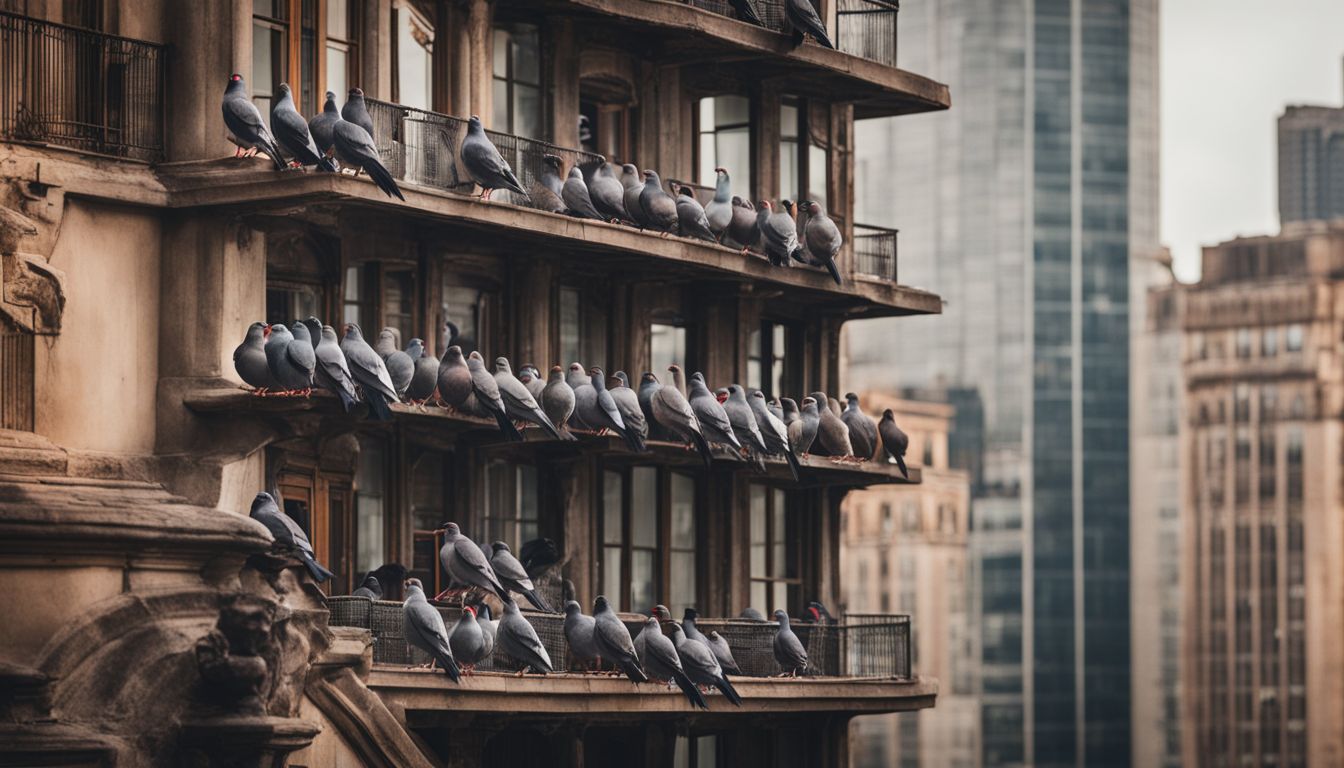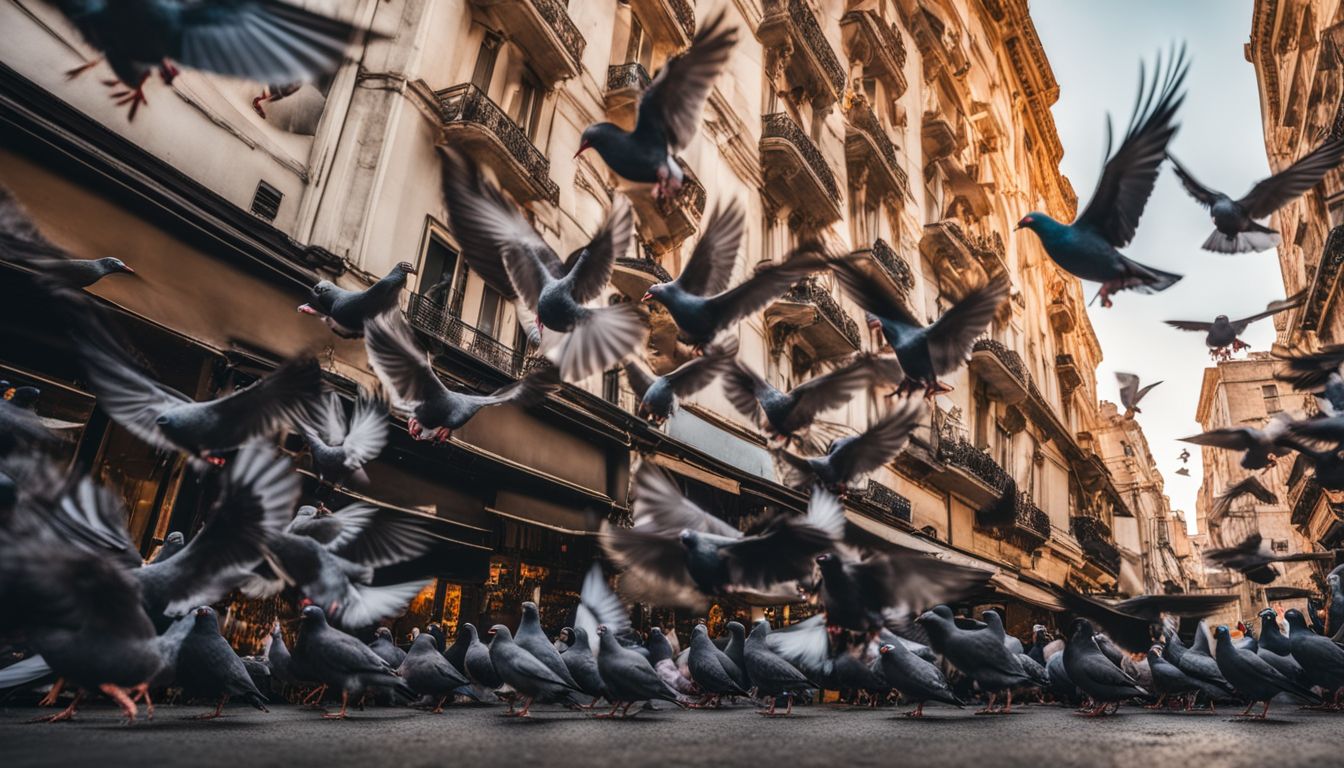
Have you ever wondered why pigeons often seem disinterested, even up close to us humans? Pigeons are unique birds with a high level of intelligence and recognition abilities that constitutes their fearless behavior.
This blog will help uncover the fascinating world of pigeon-human interaction, explaining why these city dwellers don’t flutter away like other birds at human’s approach. Let’s delve deeper into this feathered phenomenon!
Understanding Pigeon Behavior

Pigeons have adapted to the urban environment, utilizing buildings and cliffs as nesting habitats and hard surfaces like stony structures or hidden spots for protection against predators.
Adaptation to the Urban Environment
Pigeons like the city. Tall buildings remind them of cliffs where they used to live long ago. They pick hidden spots in these buildings to hide from things that might harm them. This also makes for a good place to build their nests.
Hence, you may find them at your windows or yards if they see it as safe.
Conditioned Responses to Human Interaction
Pigeons get used to being around people. They learn that people can help them. Some humans give pigeons food or treat their wounds. This makes the pigeons trust these humans more and more as time goes on.
It’s like a reward for the pigeon when they see this human friend! Over time, they stop fearing people because they know some folks are nice and helpful. They even start to notice things about us, like our faces, and can bring back good memories of us with their excellent memory skills! Pigeons truly show love and faith in those who take care of them well.
Why Are Pigeons Not Afraid of Humans?

Pigeons are not afraid of humans due to their better recognition abilities, experience with human interaction, and seeking help from humans.
Better Recognition Abilities
Pigeons are very smart. They can know who their owners are. They also remember faces well and see different facial features. Pigeons can “see” the look of art too, knowing one style from another! Their brains even let them understand human words.
This makes them smarter than apes! It is this power that helps pigeons respond to things like food – it has been trained into them over time with care and love.
Raised as Pets or Messengers
People keep pigeons as pets. They also use them to send messages. Pigeons are clever birds. With care, they learn to trust their human friends fast. Some people even teach them tricks or train them for pigeon races! Long ago, before phones and email, humans sent letters with the help of pigeons.
This is because pigeons have a great sense of direction and can find their way home from far away places. Today, many folks enjoy having pigeons at home for company. So don’t get shocked if you see a pigeon following a person around; it might be his pet or friend!
Seek Help from Humans
Pigeons seek help from humans because they trust and rely on them. They have developed a bond of affection towards humans, which makes them comfortable approaching for assistance. Pigeons depend on humans for food and treatment when they are injured or sick.
Humans provide pigeons with the necessary care, such as applying ointments to wounds and aiding in their healing process. In urban areas especially, where natural food sources may be scarce, pigeons view humans as reliable friends who can provide them with sustenance.
This reliance on humans has been established through positive experiences and interactions over time, leading to fearless behavior around people.
Do Pigeons Get Attached to Humans?

Pigeons can form attachments to humans, whether they are domestic owners, feeders, or trainers.
Attachment to Domestic Owners
Pigeons can form attachments to humans, particularly those who have provided them with consistent care and attention. When pigeons are raised by domestic owners from a young age, they develop trust and affection for their human companions.
These hand-raised pigeons see humans as a source of comfort and security, much like how pet dogs or cats view their owners. This attachment is strengthened through positive experiences, such as being fed and receiving gentle treatment.
As a result, these pigeons become faithful companions that show no fear towards their domestic owners.
Attachment to Feeders or Trainers
Pigeons can develop a strong attachment to the people who provide them with food or train them. They rely on consistent feeding schedules and specific locations, which create a sense of familiarity and trust.
Racing pigeons, in particular, form a close bond with their trainers as they work together for competitions. These attachments result from the positive experiences and care that pigeons receive from humans over time.
By forming these relationships, pigeons feel safe and secure around their feeders or trainers.
What Happens When Pigeons Do Fear Humans?

When pigeons fear humans, they exhibit signs such as flapping their wings, fluttering their feathers, and making cooing sounds as alarming signals of aggression or danger.
Signs of a Scared Pigeon
- Scared pigeons immediately fly away to a higher place when they see humans approaching.
- When scared, pigeons pull their feathers close to their body, resembling goosebumps.
- Scared pigeons may exhibit erect feathers as a sign of fear and distress.
- Pigeons let out short bursts of shrieks when they feel scared or threatened by humans.
- Scared pigeons may also show aggressive behaviors such as pecking with their beak or flapping their wings vigorously.
- Another sign of a scared pigeon is clawing at the cage or prowling around continuously.
- If a pigeon growls in a low pitch and holds keen eye contact, it may indicate that it is scared or feels threatened.
Human Behaviors that Scare Pigeons
Some human behaviors can scare pigeons and make them afraid of humans. These behaviors include:
- Capturing pigeons for petting, eating, or keeping them in zoos.
- Chasing after pigeons or trying to catch them.
- Making sudden loud noises or movements near pigeons.
- Approaching pigeons too quickly or aggressively.
- Repeatedly shooing away pigeons or throwing objects at them.
- Trying to touch or handle pigeons without their permission.
Conclusion
Pigeons are not afraid of humans because they trust and rely on us. They have adapted to the urban environment and developed recognition abilities, remembering faces and even understanding human language.
Pigeons make faithful companions and form attachments with their owners or caretakers. Despite being intelligent creatures, pigeons still need our love, care, and protection in order to thrive alongside us in our cities.
FAQs
1. Why are pigeons not scared of people?
Pigeons are not afraid of humans because they have learned over time that human beings, despite being large in size, pose no danger. This lack of fear comes from positive experiences with us and the fact that in cities, they don’t have many natural predators.
2. Can pigeons recognize us like we know each other?
Yes! Pigeons have great visual recognition skills which help them tell humans apart. They can use this skill to figure out who is a trustworthy friend and who might harm them.
3. How does living in the city change how pigeons act around people?
City pigeons live very close to people every day so they get used to our faces, sounds and actions pretty quick! Being exposed to humans so much makes these urbanized birds lose their normal fear response.
4. Do all bird types act the same around people as pigeons do?
No, different bird species react differently to humans based on their past exposure and experiences.This is why some pet birds like budgerigars or lovebirds may be more friendly compared to wild ones such as chickadees or macaws.
5.What can I do if too many pigeons cause problems at my home or garden?
You can hire a professional bird control specialist or use pigeon deterrents such as bird spikes, electronic devices or anti-roosting tools for help!
6.Do All Pigeon breeds act equally brave around humans?
Not always! Rock dove might behave differently than passenger pigeon due its own unique history with humans including keeping them as pets,taming them,eating etc.Cognitive ability also plays part here making each breed’s behavior vary accordingly.



